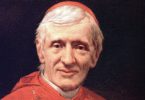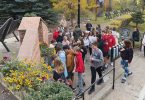Election year priorities for Catholic voters
This is the fifth and final document in a series of reflections related to the upcoming election offered by the leaders of the four dioceses of Kansas.
The intention of this reflection is not to endorse or oppose a particular candidate, political party, or political action committee. Instead, it is to show how human reasoning, enlightened by our Catholic faith, shapes our thinking, choosing and acting in daily life, including the most basic obligation of citizenship: voting.
Promoting the common good
Each of us has a moral obligation to work toward the common good. By so doing, we follow Our Lord’s instruction to “love your neighbor” (Mk 12:31). We all have a stake in the common good, for “in keeping with the social nature of man, the good of each individual is necessarily related to the common good” (Catechism of the Catholic Church, No. 1905).
The catechism tells us: “It is necessary that all participate, each according to his position and role, in promoting the common good. This obligation is inherent in the dignity of the human person. . . . As far as possible citizens should take an active part in public life” (No. 1913-1915).
We are so blessed to live in a country that offers us the opportunity to participate in the political process in order to contribute to the common good without fear of incarceration, exile, or death. This privilege was purchased at a high price, a fact that should weigh heavily on the minds of those inclined to leave the building of a just society to others.
The church’s role
Some, in an attempt to silence the church’s voice in matters of public policy, point toward the doctrine of “separation of church and state,” when in fact those words never appear in America’s founding documents, and the concept has always, until recently, been understood as a protection for religion against state encroachment. Sadly, America’s long tradition of religious freedom is in jeopardy, as unprecedented attacks on religious liberty, such as the HHS “contraceptive mandate,” are becoming more frequent.
The church has a constitutional right, like other organizations, to express its viewpoint on matters of public policy. However, the Catholic Church is not a political interest group. Rather than instructing Catholics who to vote for, the church’s role in the political process is to illuminate the moral dimension of the various political issues and to form the consciences of Catholics so that they can make morally informed judgments as both voters and elected officials.
What our faith tells us
Catholicism is not a political philosophy or program. The Catholic Church is not a “third party” that mixes some politically liberal positions with some politically conservative positions. Catholicism is, instead, a two-thousand-year-old religious faith bearing timeless truths. After twenty centuries, the church has much to teach regarding the application of moral principles to political questions.
One such principle is that not all political issues carry the same moral weight. It is important, then, that Catholics take seriously the responsibility to distinguish between those few issues where Catholics are obligated to be unified, and the great majority of concerns where Catholics, exercising their prudential judgment, can legitimately reach different conclusions.
Not negotiable
Certain political issues place a special claim upon the Catholic conscience. These issues, where matters of intrinsic evil directly intersect with public policy, require unity from the Catholic faithful. Something is understood to be intrinsically evil if it is evil in and of itself, regardless of our motives or the circumstances. The Catholic faith requires Catholics to oppose abortion, embryonic stem-cell research, euthanasia, assisted suicide, and the redefinition of marriage. These matters are not negotiable, for they contradict the natural law, available to everyone through human reasoning, and they violate unchanging and unchangeable Catholic moral principles.
While these issues are often adjudicated in the political arena, they are not, strictly speaking, “political issues.” Instead, they are fundamentally moral questions involving core Catholic teachings on what is right and what is wrong. Catholics who depart from church teaching on these issues separate themselves from full communion with the church.
Prudential judgment
Unlike the aforementioned cases, most political issues do not involve a choice between an intrinsically evil policy and a morally just policy. With respect to most other issues, politics often involves choosing among the many shades of gray.
There are a wide variety of issues that rightly claim the attention and concern of faithful Catholics, including immigration, poverty, environmental protection, criminal justice, health care, and many, many others. Catholics are obliged to concern themselves with the common good and, since these and other important issues bear directly upon the common good, Catholics should not be indifferent to them.
When determining which policy solutions are best, Catholic voters and policymakers have an obligation to apply Catholic moral principles to these questions. Yet even when they do so with sincere hearts, they may reach very different conclusions. Holy Scripture and sacred Tradition do not tell us what levels various government programs should be funded at, or whether the federal government, state and local governments, the private sector, or some combination of the above are best equipped to deal with certain problems. Catholic social teaching provides us with a moral framework to guide our consideration of such questions, but it is the role of a properly formed laity to apply Catholic moral principles and determine which public policies best serve the common good.
Putting first things first
Few Americans will ever have the pleasure of voting for a candidate who shares his or her opinion on every single political question. Thus we all face the task of prioritizing which issues take precedence over others.
While it may run counter to the prevailing political culture, the moral imperative of ending abortion, which has claimed the lives of over 50 million unborn Americans since 1973, takes priority over even critically important issues like restoring America’s broken economy. Catholics have a moral obligation to use all of the means at their disposal as voters and as public officials to resist intrinsically evil public policies, even if it means subordinating their political preferences on other important concerns.
Conclusion
The task of making morally informed judgments on matters of politics and public policy can be challenging. It can involve the questioning of old assumptions, a process that can be uncomfortable and even painful. For the politically active, it can be tempting to allow party loyalty to supersede more important considerations. For too many others, confusion, disillusionment, or even plain apathy can discourage engaged citizenship.
Fortunately, we are not without aid in approaching the sometimes complex moral questions confronting American voters. Catholics have access to the rich depository of wisdom found in the social teaching of the popes. We have the rich and diverse commentary on political issues that is the fruit of a free society such as ours. Most important of all, we have access to the grace of Our Lord Jesus, who lovingly hears the prayers of those seeking wisdom and discernment. None of us is left to face the challenges of faithful citizenship alone.
Most Rev. Joseph F. Naumann, DD
Archdiocese of Kansas City in Kansas
Most Rev. Michael O. Jackels, STD
Diocese of Wichita
Most Rev. John B. Brungardt, DD
Diocese of Dodge City
Most Rev. Edward J. Weisenburger, JCL
Diocese of Salina
CATHOLIC PERSPECTIVE
The Kansas Catholic Conference Web page includes all of the documents published by the Kansas bishops thus far and how state legislators have voted on issues of importance to Catholics. Go to: www.kscathconf.org/2012/07/19/election-year-2012.
VOTING INFORMATION
• Oct. 16 is the last day to register to vote in the general election.
• Advance voting begins Oct. 17.
• The deadline for voters to apply for advance voting ballots to be mailed to them is Nov. 2.
• The deadline to cast advance voting ballots in person at the county election office is noon Nov. 5.
• Advance voting ballots must be received in the county election office by 7 p.m. Nov. 6.
• The general election is Nov. 6






